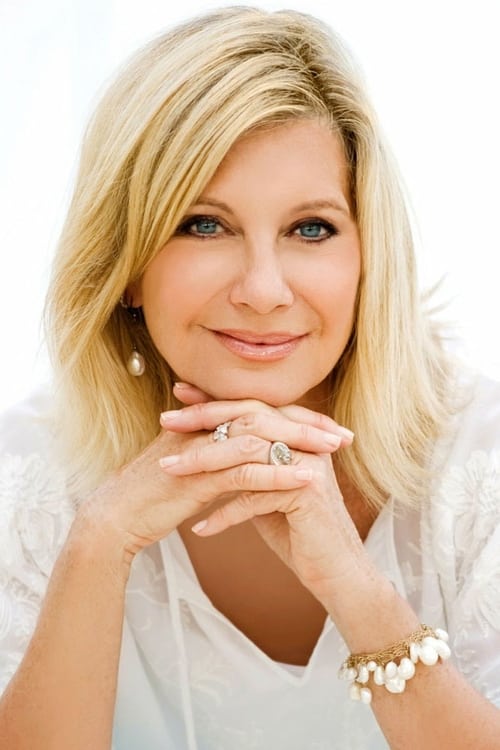Dame Olivia Newton-John AC, DBE (26 September 1948 - 8 August 2022) was an English-born, Australian-raised singer and actress. She was a four-time Grammy award winner who had amassed five No. 1 and ten other Top Ten Billboard Hot 100 singles and two No. 1 Billboard 200 solo albums. Eleven of her singles (including two platinum) and 14 of her albums (including two platinum and four double platinum) have been certified gold by the RIAA. Her music has been successful in multiple formats including pop, country and adult contemporary and has sold an estimated over 100 million albums worldwide. She co-starred with John Travolta in the film adaptation of the Broadway musical, Grease, which became one of the most successful films and movie soundtracks in Hollywood history. Newton-John has been a long-time activist for environmental and animal rights issues. Since surviving breast cancer in 1992, she had been an advocate for health awareness becoming involved with various charities, health products and fundraising efforts. Her business interests had included launching several product lines for Koala Blue and co-owning the Gaia Retreat & Spa in Australia. Newton-John had been married twice. She currently lives with her second husband, John Easterling, in Jupiter Inlet Colony, Florida. She was the mother of one daughter, Chloe Rose Lattanzi, with her first husband, actor Matt Lattanzi.
Description above from the Wikipedia article Olivia Newton-John, licensed under CC-BY-SA, full list of contributors on Wikipedia.
Organised, caring and driven by duty the ESFJ personality type loves to contribute and remain constantly valued, productive, busy and liked. The ESFJ has an action-orientation that they will channel into people, helping and finding practical solutions to people issues and they'll work hard at making this happen as they are naturally oriented to the needs of those around them. Whilst the ESFJ wants everyone to feel valued, they will also want to feel part of the group themselves - they need to feel included. If someone is hurting, the ESFJ will be the first to respond.
The ESFJ character shares the same action-orientation of the ESTJ but with a people-based focus, they channel their drive, energy and practical nature into helping people. Driven by a sense of duty they are the cooperative, helpful, sympathetic and personable pragmatists, disliking anything ethereal or woolly as they prefer practical solutions to people issues, and they'll work hard at making this happen. Unlike the ESFP the ESFJ will want a plan and closure, they do not like loose ends or anything they perceive as sloppy or messy. As with most 'S's, they prefer the concrete, inhabiting a world of facts and the ‘here and now.’ Asking an ESFJ to sit and think things through or reflect before ‘doing’ is not easy as their natural propensity is for action; thinking is seen as a passive and useless activity. This means they will jump immediately into ‘sorting it all out,’ when at times if they’d taken a little longer to think they may have come up with a better solution. Organised, caring and driven by the known, routine comes naturally to the ESFJ who fear change as it is drags them out of the place where they feel they are strong and where they can contribute.
Conscientious and caring, the ESFJ will be good at follow-through and making sure the routine is taken care of, but may struggle with anything which appears complex, or which is perceived as not clearly getting the intended result or which causes conflict or disharmony. They value family links, friendships and tend to be slightly sentimental in their approach. Under pressure an ESFJ may become like the 'controlling parent,' smothering others in their attempt to provide support and believing that their way is best, becoming sensitive to any perceived criticism. Their values of ‘doing good’ and working hard to make sure things and people are taken care of are at the core of the ESFJ although they may at times try to instil these parental-style values in others, often using parental type words like "should," "ought" and "must." These are all said with a good heart and desire to help but the subjective nature of the ESFJ means that they may almost impose what they think is best in their desire for immediate practical help.
Being ‘F’s ESFJs may have trouble making more logical and factual decisions so driven are they by their values and wishing to maintain harmony, so their decisions will be primarily driven by the needs of those around them especially those close to them whom they feel a duty to ‘care for.’ Everything for the ESFJ becomes personalised and will be filtered through a more subjective ‘how do I feel about this person’ lens, rather than being objective and logical as a logical approach for the ESFJ is equated with being cold and harsh thus negating being helpful which is at the core of the ESFJ being. After a day interviewing I asked my ESFJ secretary to tell the successful candidate he’d got the job. “Was he the nicest?” she asked, “Did you like him best?" No issue of ‘suitability’ even crossed her mind! They tend also to have more of a ‘gate-post,’ binary mentality, seeing things in very black and white, ‘good or bad,’ ‘right or wrong,’ ‘nice or horrible.’ Being driven by feelings can also mean that the ESFJ gets hurt easily by any perceived or real criticism as everything is taken so personally, so factually and they can dwell on such criticism. Anything which appears complex or which has many shades of grey will be dismissed as it doesn’t conform to the ‘natural laws’ of ‘ESFJ common sense.’ They’ll want to jump in and help, which is why they were, according to their own values, ‘put on this earth.’
Choose another celebrity type to compare side by side the different approaches work, attitudes to conflict and the way they engage with others.
